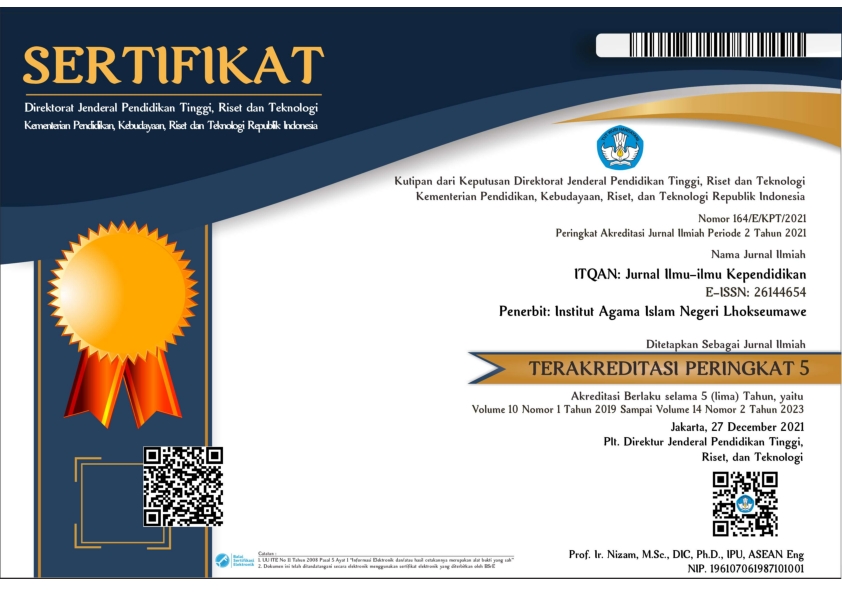Pengembangan Perangkat Pembelajaran Matematika Berbasis Masalah untuk Melatih Keterampilan Metakognitif Peserta Didik
Main Article Content
Saiful Bachri
Lis Sugianto
Tri Bondan Kriswinarso
Ikram Lihu
This research aims to develop the qualified instructional design in
Mathematical problem-based learning to increase the Students’
metacognitive skills on sine, cosine, and triangles area materials. It used the
Plomp model development procedure that consists of the initial investigative
phase; the design phase; the realization phase; the testing phase, the evaluation,
and revision phase; and the implementation phase. Furthermore, to develop the
instruction, the design was adapted to the characteristic and learning syntax
based on problem-based learning. The instructional designs that have been
developed through this research are lesson plans, material, student worksheets,
and achievement tests. Based on the result and try-out that were analyzed, the
instructional design-based problem learning to increase the student’s
metacognitive skills of the Tenth Grade of SMA Negeri 3 Palopo on sine, cosine,
and triangles materials meets valid, practical, and effective criteria.
Anugraheni, I. (2018). Pengembangan perangkat pembelajaran matematika berbasis pendidikan karakter kreatif di sekolah dasar. Refleksi Edukatika: Jurnal Ilmiah Kependidikan, 8(2).
Faizal, M.A & Mahardika D.K.W. (2018).Pengembangan Perangkat Pembelajaran Berbasis Masalah Kontekstual untuk Meningkatkan Kemampuan Metakognisi Siswa Sekolah Dasar. Journal of Medives, 2(1), pp. 117-128. IKIP Veteran Semarang.
Fauziana, A. (2008). Identifikasi Metakognisi Siswa dalam Memecahkan Masalah Matematika Kelas VIII-F SMPN 1 Gresik. Surabaya: Universitas Negeri Surabaya.
Hung, W., Jonassen, D. H., & Liu, R. (2008). Problem-based learning. In Handbook of research on educational communications and technology (pp. 485–506). Routledge.
Ikram, Z. J. W., & Aziz, N. (2017). Kegiatan Metakognitif dalam Pemecahan Masalah Matematika. Prosiding Seminar Nasional “Tellu Cappa,” September, 810–820.
Ilyas, M., & Fitriani, A. (2014). Pengembangan Bahan Ajar Matematika Berbasis Problem Posing dengan Scaffolding Metakognitif pada SMPN Kota Palopo. Prosiding, 1(1), 34–46.
Iskandar, N. (2018). Metakognitif: Pengertian, Elemen, dan Penerapan dalam Pembelajaran. Jurnal Subulana, 1(2).
Kemendikbud. (2019). Peringkat dan Capaian PISA Indonesia MengalamiPeningkatan. [Online]. https://www.kemdikbud.go.id. Diakses tanggal 28 Desember 2021.
Marisa, R., & Fazilla, S. (2020). Pengembangan Kemampuan Pemecahan Masalah Matematis Siswa SD dengan Didactical Engineering. ITQAN: Jurnal Ilmu-Ilmu Kependidikan, 11(2), 139–158.
Pradnyani, I. A. R., Marhaeni, A., & Made, A. I. (2013). Pengaruh Model Pembelajaran Numbered Head Together Terhadap Prestasi Belajar Matematika Ditinjau dari Kebiasaan Belajar di SD. Ganesha University of Education.
Purwati. (2009). Pengembangan Perangkat Pembelajaran Matematika dalam Model Kooperatif Tipe STAD pada Siswa Kelas VII SMP Negeri 2 Sabbang. Skripsi FMIPA UNM Makassar.
Ruseffendi, E. T. (1988). Pengajaran matematika modern dan masa kini: untuk guru dan SPG: berbagai strategi, teknik dan pendekatan dalam pengajaran bilangan cacah.
Salabi, A. S. (2020). Efektivitas dalam Implementasi Kurikulum Sekolah. Education Achievement: Journal of Science and Research, 1(1), 1–13. https://pusdikra-publishing.com/index.php/jsr/article/view/177.
Sariningsih, R. & Purwasih, R. (2017). Pembelajaran Problem-Based Learning untuk Meningkatkan Kemampuan Pemecahan Masalah Matematis dan Self Efficacy Mahasiswa Calon Guru. JNPM: Jurnal Nasional Pendidikan Matematika, 1(1), 163-177.
Schwartz, P. (2013). Problem-based learning. Routledge.
Sugiyono. (2015). Metode Penelitian Kuantitatif Kualitatif R & D. Bandung: Alfabeta.
Wood, D. F. (2003). Problem-based Learning. Bmj, 326(7384), 328–330.



